
 'Taken 2' grabs movie box office crown
'Taken 2' grabs movie box office crown
 Rihanna's 'Diamonds' tops UK pop chart
Rihanna's 'Diamonds' tops UK pop chart
 Fans get look at vintage Rolling Stones
Fans get look at vintage Rolling Stones
 Celebrities attend Power of Women event
Celebrities attend Power of Women event
 Ang Lee breaks 'every rule' to make unlikely new Life of Pi film
Ang Lee breaks 'every rule' to make unlikely new Life of Pi film
 Rihanna almost thrown out of nightclub
Rihanna almost thrown out of nightclub
 'Dark Knight' wins weekend box office
'Dark Knight' wins weekend box office
 'Total Recall' stars gather in Beverly Hills
'Total Recall' stars gather in Beverly Hills
Family saga rewinds
Updated: 2012-09-21 07:34
By Liu Wei (China Daily)
|
|||||||||
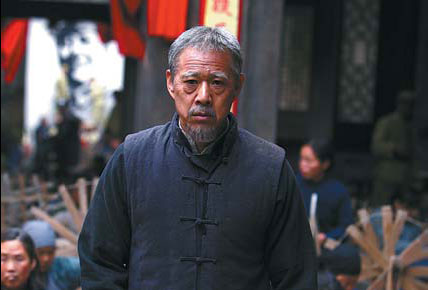
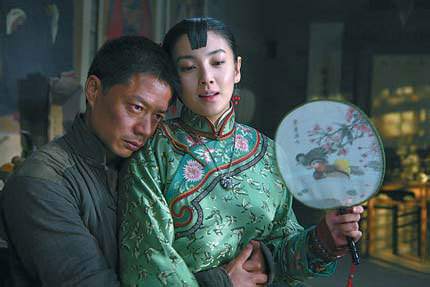
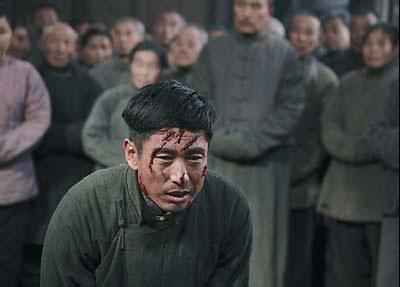
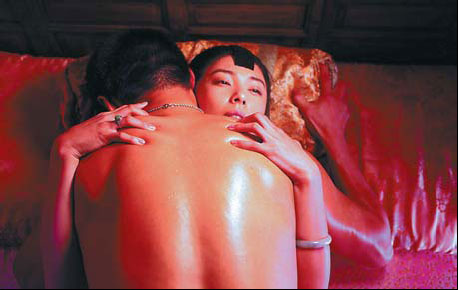
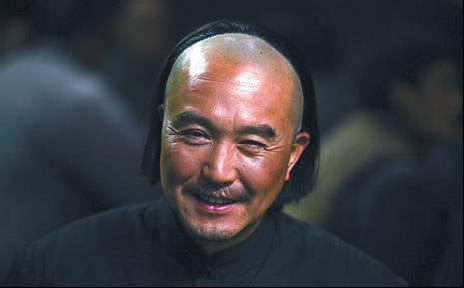
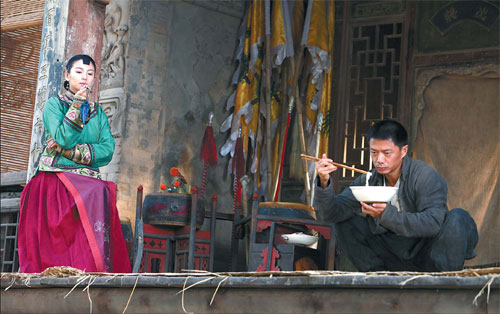
A film adaptation of the literary classic White Deer Plain condenses the lives of 20 characters at a formative time in China's history. Liu Wei in Beijing learns more.
Wang Quan'an first read White Deer Plain when he was a student at Beijing Film Academy. The family saga set in Shaanxi province features plenty of history and sex.
He did not expect that years later he would direct the first film based on the novel. Many filmmakers, including Wang himself, have considered White Deer Plain to be a novel that could not be successfully adapted into a film. "The book is so intense and complicated that it is easier to adapt it into 10 films instead of one," he says.
A must-read for anyone who wants to understand the country and its people better, the book traces the ups and downs of two rural clans in the first half of the 20th century in Shaanxi.
Winner of China's top literature honor, the Mao Dun Literature Prize, it has been a popular story among Chinese directors, Zhang Yimou and Chen Kaige included.
The film was released in China on Sept 15, 20 years after the book was published in 1993, eight years after Wang was involved in the project and seven months after the film won a Silver Bear in the Berlin festival.
At a recent seminar to mark the 20th anniversary of the book, writer Chen Zhongshi gave the film 95 marks.
"It is the highest score I have ever gotten since my first day at school," Wang says.
Wang, 47, was first involved in the project when Lu Wei, scriptwriter of Chen Kaige's iconic Farewell My Concubine, found him and suggested they make the film together. The budget then was only 30 million yuan ($4.6 million).
At that time Wang had made only two low-budget art-house films. He recalls that he was at first "not ambitious to handle an epic", but White Deer Plain was so tempting a subject that they finished a script.
However, the authorities did not approve of it. So Wang wrote one on his own, but the main investor, Xi'an Film Studio, was short of money at the time.
In the following two years, Wang made two more art-house films. Tuya's Marriage about an Inner Mongolian woman's choice to take her disabled husband into her new marriage, which won a Golden Bear in Berlin; and Apart Together about a veteran's return from Taiwan to the mainland, which won silver for best screenplay in Berlin.
In 2010, Wang joined his powerful producer, Zhang Xiaoke, general manger of Shaanxi Tourism Group. When filming of White Deer Plain finally started, the budget had increased to 100 million yuan.
For an art-house film in China, the budget was huge and meant that while Wang targeted international film festivals before, he had to win over a much wider group in his homeland with the new film.
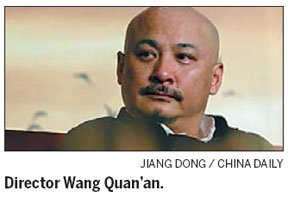
While his producer tried various means to meet this end, including building a recreational theme park in Shaanxi, Wang gathered some of China's most well received actors such as Zhang Fengyi and Wu Gang to please audiences.
He let the actors do only two things before shooting started: practice the Shaanxi dialect and do farm work.
"For me, the book tells how Chinese people were stunned by the fall of the imperial system and they have been confused building a new system of values, until now."
Chen, the original writer, confronts the characters, mostly farmers, with the social upheavals from the 1910s to the 1940s - the downfall of Qing Dynasty (1644-1911) up to the dawn of New China.
While some senior figures try to hold on to old values, the younger generation eagerly embraces fresh ideas - some join the Communist Party, others go over to the Kuomintang, and a few become opportunists seeking personal gain.
To digest more than 20 major characters' life choices in a span of 50 years was so challenging that Wang's first cut was 220 minutes. Shortly before he took it to 2012's Berlin festival as the only competing Chinese film, he edited it down to 160 minutes, removing mainly scenes after 1938, one year after the War of Resistance against Japanese Aggression (1937-45) started. The film won a Silver Bear for best cinematography.
In the 156-minute re-edited version, currently in Chinese theaters, the story ends in 1938. Some sex scenes are thought to have been cut. "I never planned to make the shots sensuous," Wang says. "They must work for the portrayal of the characters. Every shot is driven by the drama."
Although the final version screened now is very different from the original cut, Wang is not complaining and would rather move on. "I feel more than happy the film is released. The turbulence the film experienced is nothing compared to what the characters in the book have been through," he says. "You never know when the perfect timing is to make a film. If you have the drive and determination for something, you go for it."
(China Daily 09/21/2012 page18)
Most Viewed
Editor's Picks

|

|

|

|

|

|
Today's Top News
Health new priority for quake zone
Xi meets US top military officer
Japan's boats driven out of Diaoyu
China mulls online shopping legislation
Bird flu death toll rises to 22
Putin appoints new ambassador to China
Japanese ships blocked from Diaoyu Islands
Inspired by Guan, more Chinese pick up golf
US Weekly

|

|







